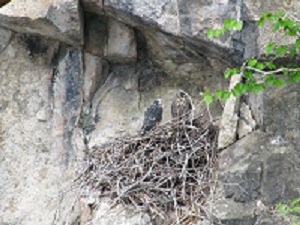
Hiking Vermont’s hillsides is a great way to enjoy a spring day, but the Vermont Fish and Wildlife Department and Audubon Vermont recommend people check to see if the area they are planning to hike or climb is open. In addition to the many trails that are currently closed to limit the spread of the Coronavirus, several cliff areas are closed to protect nesting peregrine falcons.
“Peregrine falcons are very sensitive to human presence during their breeding season, so we ask climbers and hikers to please maintain a respectful distance from all nests,” said state wildlife biologist Doug Morin. “The areas closed include the portions of the cliffs where the birds are nesting and the trails leading to cliff tops or overlooks.”
These sites will remain closed until August 1 or until the Vermont Fish and Wildlife Department determines the risk to nesting falcons has passed. If nesting falcons choose new sites, additional sites may be added to the closed list at www.vtfishandwildlife.com.
Barnet Roadcut (Barnet) – Rte 5 pullout closed
Bolton Notch (Bolton) – UUW cliff – cliff access and climbing closed
Bone Mt (Bolton) – portions closed to climbing
Deer Leap (Bristol) – cliff-top and climbing closed
Eagle Ledge (Vershire) – closed to hiking and climbing
Fairlee Palisades (Fairlee) – cliff-top closed
Hazens Notch (Lowell) – closed to climbing
Marshfield Mt (Marshfield) - portions closed to climbing
Mt Horrid (Rochester) – Great Cliff overlook closed
Nichols Ledge (Woodbury) – cliff-top closed
Prospect Rock (Johnson) – cliff-top (trail has been re-routed) and climbing closed
Red Rocks Park (S. Burlington) – southern cliff access closed
Rattlesnake Point (Salisbury) – southern overlook closed
Snake Mt (Addison) – overlook south of pond closed
Audubon Vermont conservation biologist Margaret Fowle works with volunteers and other conservation professionals to monitor the sites throughout the nesting season. “Peregrine falcons were removed from Vermont’s endangered species list in 2005, and the population continues to thrive thanks to the efforts of our many volunteers and partners,” said Fowle. “In many cases the lower portions of the trails remain open, and we encourage people to enjoy watching peregrine falcons from a distance with binoculars or a scope.”
What you can do to help Vermont peregrines:
Respect cliff closures, and retreat from any cliff where you see peregrines
Report any disturbance of nesting peregrines to your local State Game Warden
Report any sightings to Margaret Fowle at margaret.fowle@audubon.org
For Immediate Release: May 6, 2020
Media Contact: Doug Morin, VT Fish & Wildlife 802-793-3837; Margaret Fowle, Audubon Vermont 802-238-0046
